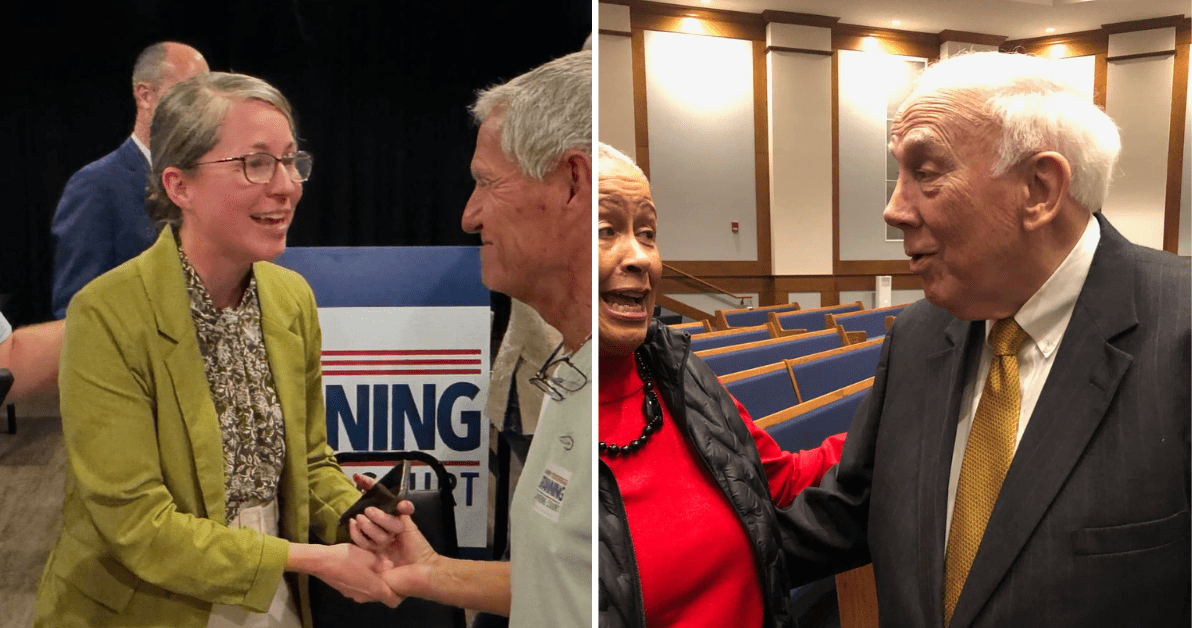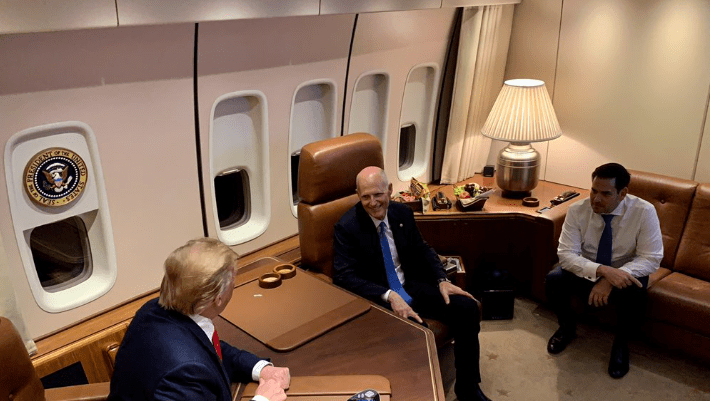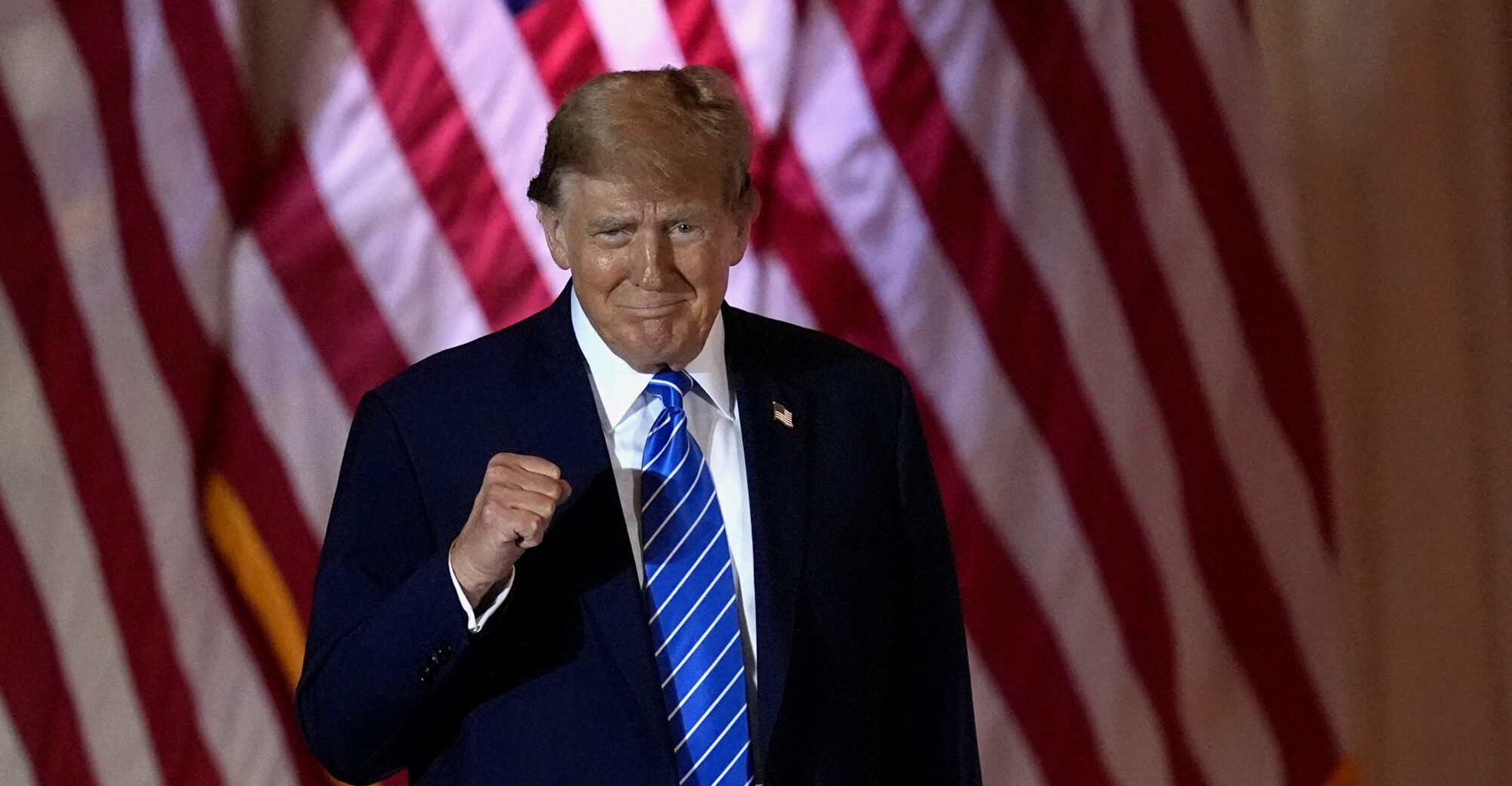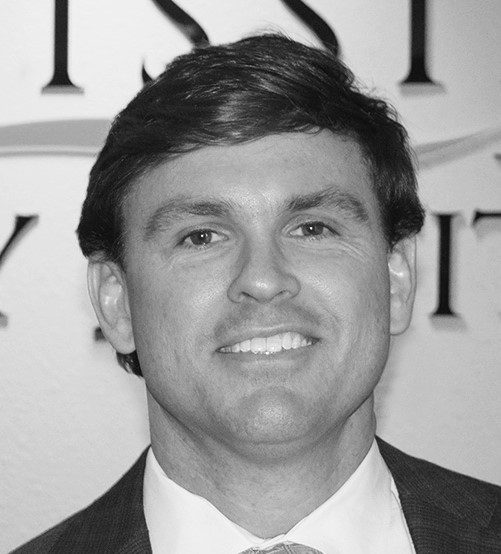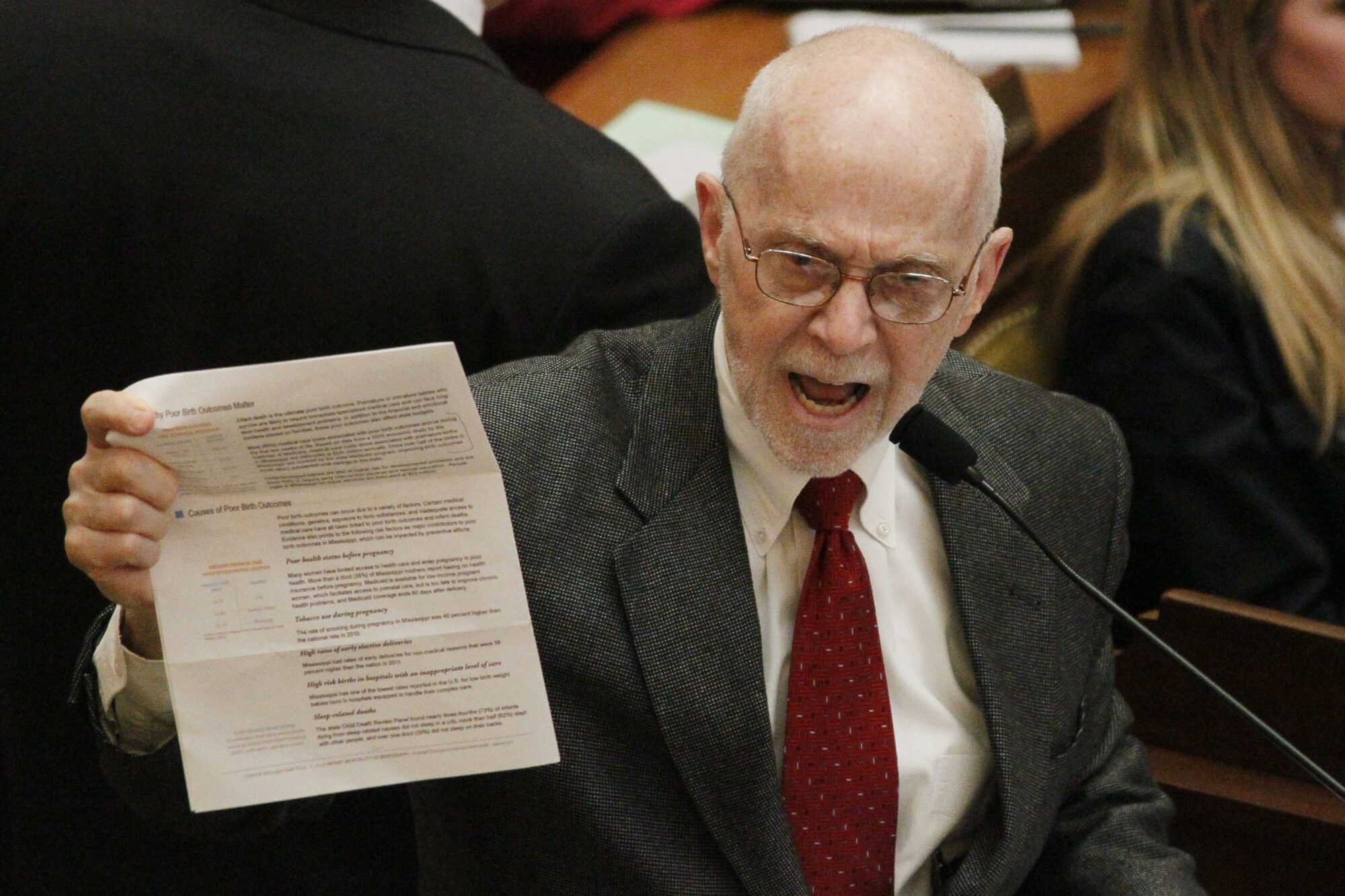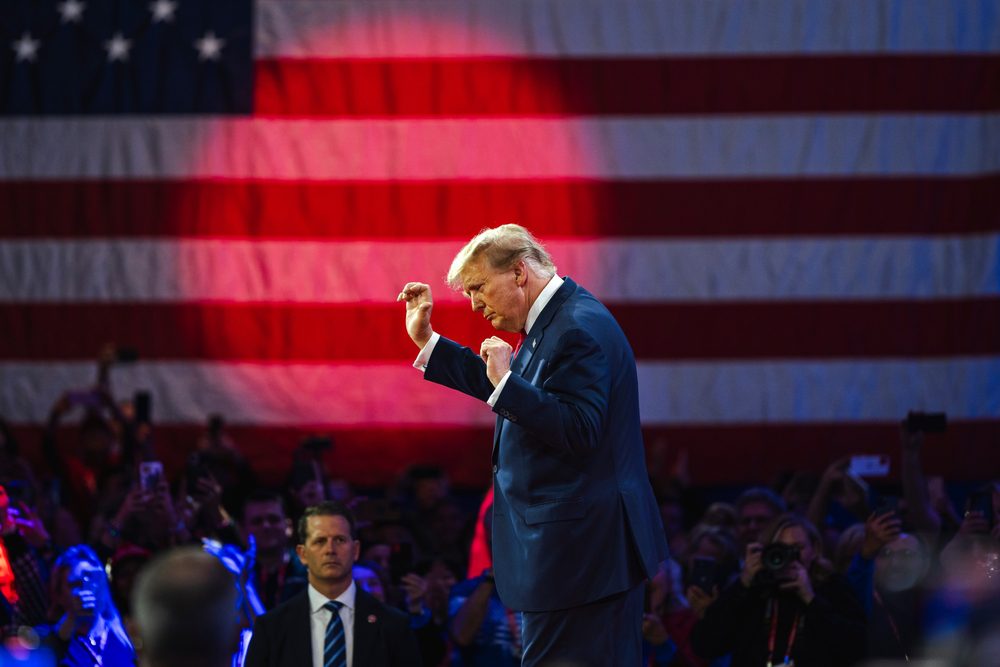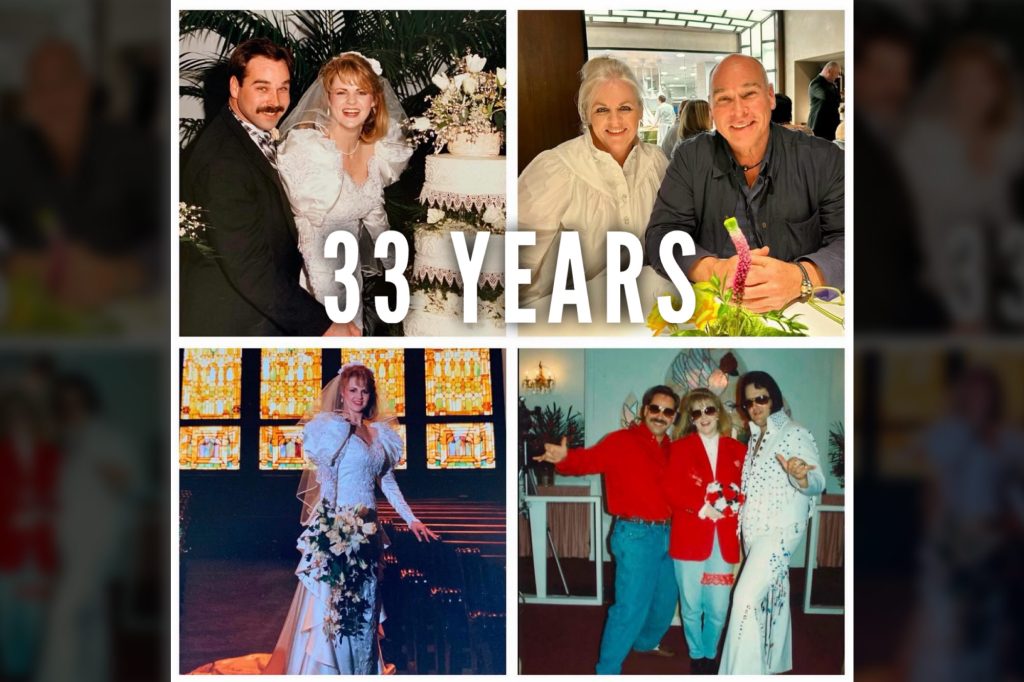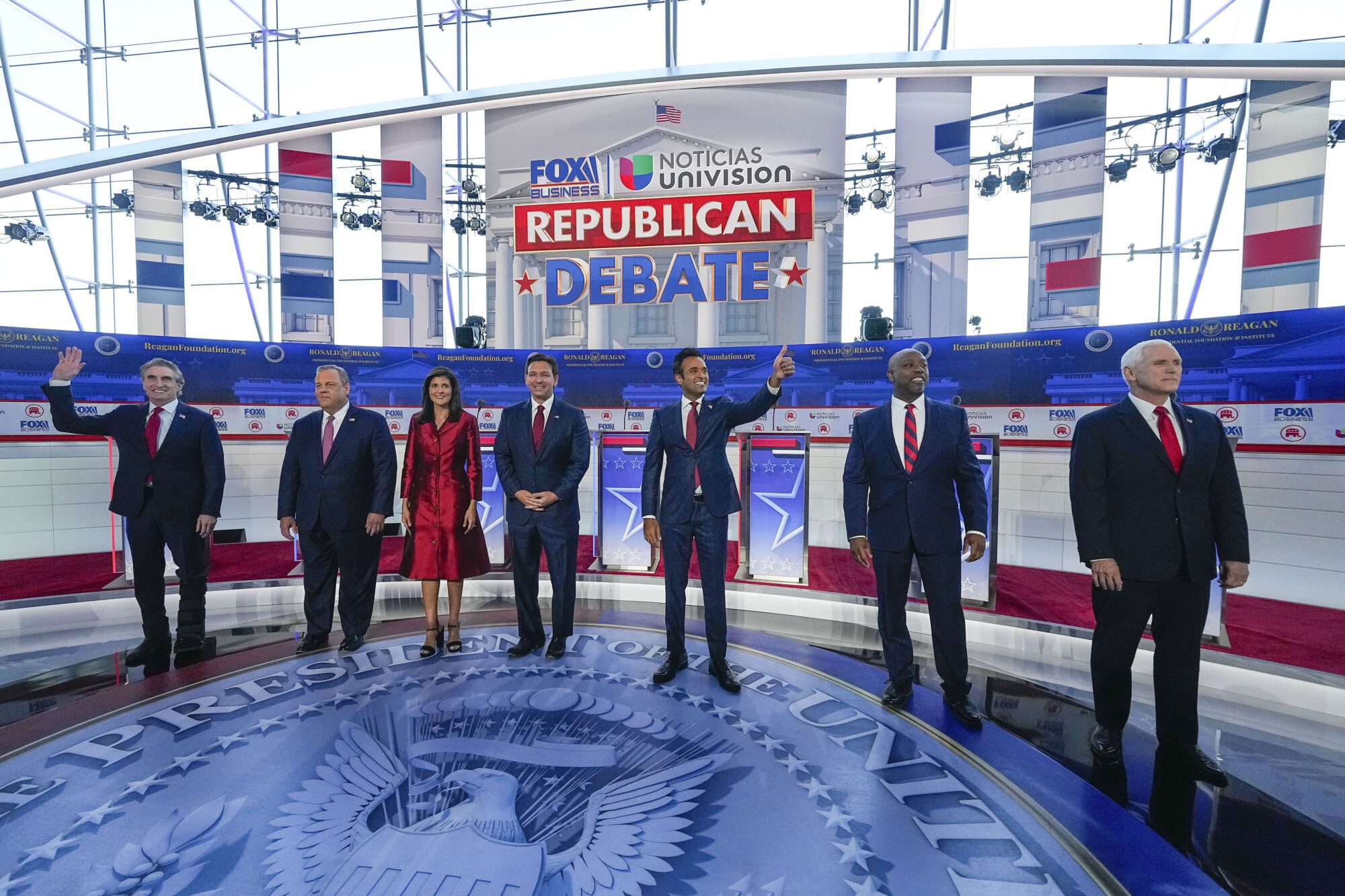
Republican presidential candidates, from left, North Dakota Gov. Doug Burgum, former New Jersey Gov. Chris Christie, former U.N. Ambassador Nikki Haley, Florida Gov. Ron DeSantis, entrepreneur Vivek Ramaswamy, Sen. Tim Scott, R-S.C., and former Vice President Mike Pence, before the start of a Republican presidential primary debate hosted by FOX Business Network and Univision, Wednesday, Sept. 27, 2023, at the Ronald Reagan Presidential Library in Simi Valley, Calif. (AP Photo/Mark Terrill)
This intense desire to break out of the pack – to emerge as the clear alternative to Trump – led to frequent cross-talk that made it difficult for the television audience to hear, and to constant interrupting and pointed insults by the seven candidates.
SIMI VALLEY, Calif. — Ron DeSantis needed a big night to revive his stalled presidential campaign and come within shouting distance of former President Donald Trump. It was a heavy lift, and probably too much to ask.
Florida’s governor certainly had his moments during the second Republican debate of the 2024 presidential season, sounding more poised and natural than he has been on the campaign trail or in the first debate last month. But DeSantis and the other six hopefuls were compromised by the format, fussy debate moderators, and their own propensity to bicker and interrupt one another.
Although the setting was the Ronald Reagan Presidential Library & Museum, the “11th commandment” popularized by Reagan (“Thou shalt not speak ill of any fellow Republican”) was in short supply here Wednesday night. Part of the problem was the palpable desperation on the part of a field that hasn’t dented Trump’s huge lead in the polls, either nationally or in the early primary states.
This intense desire to break out of the pack – to emerge as the clear alternative to Trump – led to frequent cross-talk that made it difficult for the television audience to hear, and to constant interrupting and pointed insults by the seven candidates, some of which were directed at the man who wasn’t here.
“Donald Trump is missing in action,” DeSantis said. “He should be on this stage tonight.” The most colorful criticism came from former New Jersey Gov. Chris Christie, whose campaign is predicated on bashing Trump. In a premeditated stunt, Christie turned to the camera and said, “Donald, I know you’re watching, you can’t help yourself. You’re not here tonight, not because of polls, and not because of your indictments. You’re not here tonight because you’re afraid of being on the stage and defending your record. You’re ducking these things … You keep doing that, and no one up here is going to call you Donald Trump anymore. We’re going to call you Donald Duck.”
Actually, Trump at that moment was working a crowd in Michigan where he went to troll President Biden, who broke with historical precedent to take a stint on the picket line with striking United Auto Workers. Trump’s aim was wooing blue-collar voters in the swing state of Michigan while blaming the Democrats’ fixation on green energy for the autoworkers’ woes. Attempt to drive a wedge between union workers and environmental activists, Trump accused Democrats of leading a “hit job” on Detroit.
“You can be loyal to American labor, or you can be loyal to the environmental lunatics,” Trump said, “but you can’t really be loyal to both – it’s one or the other.”
The 45th U.S. president also ridiculed his fellow Republican presidential contenders, questioning their motives for running and dismissing their chances of joining him on a 2024 Trump ticket. “They all want to be something,” Trump told rallygoers at a non-union auto parts manufacturing plant in Clinton Township. “Secretary of something. Even VP. Anybody see a VP? Nah.”
Marc Short, who served as Mike Pence’s chief of staff when he was vice president, punched back at Trump. “In light of the way the first administration completed, I’m not sure who would actually want to be his vice president,” Short told RealClearPolitics after the debate.
The first debate, held last month in Milwaukee, did little to alter the existing GOP pecking order. Far ahead in the polls both nationally and in the early primary states going into the Milwaukee debate, Trump also skipped that event. Although there is no evidence this hurt him with rank-and-file Republicans, one GOP candidate – former South Carolina governor and United Nations ambassador Nikki Haley – did improve her standing in the polls with a forceful performance.
Her rise came partly at the expense of political novice Vivek Ramaswamy, who struggled in his first exposure to a mass audience. A 38-year-old businessman with no political experience, Ramaswamy alienated the rest of the primary field and struck many viewers as arrogant and condescending. At one point, he claimed in Milwaukee that he was the only one on stage who wasn’t “bought and paid for.”
Cognizant of how he came across in in the first debate, Ramaswamy waited for the right moment to address it Wednesday night. His opportunity came when he was criticized for his willingness to participate in a TikTok chat with social media influencer Jack Paul, when leading Republicans in Washington have advocated banning the app because of Chinese ownership and spying capabilities.
“So, the answer I have [is] a radical idea of the Republican Party,” the millennial biotech entrepreneur remarked. “We need to win elections. And part of how we win elections is reaching the next generation of young Americans where they are.”
Switching gears, the often-flippant Ramaswamy suddenly grew introspective while offering a clearly rehearsed mea culpa.
“Let me level with all of you, I’m the new guy here, and so I know I have to earn your trust,” he conceded. “What do you see? You see a young man who’s in a bit of a hurry, maybe a little ambitious, bit of a know-it-all, it seems, at times. I’m here to tell you, no, I don’t know it all. I will listen. I will have the best people and the brightest in this country, whatever age they are, advising me,” he added.
Haley wasn’t having any of it; she quickly stepped on his moment. “This is infuriating because TikTok is one of the most dangerous social media apps that we could have,” she said. “Honestly, every time I hear you, I feel a little bit dumber for what you say.”
But if Haley’s antipathy for Ramaswamy seems visceral, the fight she picked with Sen. Tim Scott was discordant. The two South Carolinians had been longtime allies – as governor, she appointed Scott to the U.S. Senate – and when Perino pointedly asked Scott why he’d make a better president than Haley, Scott refused to engage. Instead, he simply made his own case, but not at the expense of Haley or anyone else.
When Haley got her turn at the microphone, she did not return the favor, attacking Scott on the dubious grounds that the federal budget had increased while he’s been in Washington. Later, when Scott did punch back, Haley smiled and said, “Bring it, Tim!”
While this was going on, DeSantis and Ramaswamy stood between them grinning. The one who should have been smirking was Donald Trump, as it was hard to see how this hot mess of a debate would do anything to erode his support.
Exacerbating the yelling and mutual bullying on the part of the candidates were several goofy questions by the moderators – Perino, Stuart Varney of Fox Business, and Ilia Calderón of Univision – who inisted on running through their list of pre-written questions even at the expense of interfering with the debate’s natural flow. To be fair, they had trouble controlling candidates who had no compunction about interrupting each other.
Amid the fractious bickering, Republicans were united on a few main bogeymen they know resonate with their base. They trained their focus and fire on China, the deadly fentanyl crisis, the chaos at the southern border, and the crime wave besieging America’s cities.
And though the candidates kept paying lip service to Ronald Reagan’s name, none of them displayed much of a feel for the Gipper’s style, and certainly not for Reagan’s dry wit. The attempts at humor ran the gamut from tasteless to juvenile. None seemed to strike the audience in the hall as remotely funny. Perhaps more to the point, few of these candidates proposed policies Reagan would even recognize as his own. This is not entirely their fault. As Fox News eminence grise Brit Hume put it succinctly in his pre-taped introduction to the debate: “What does it mean to be a conservative? Would Reagan even recognize the country in which we now live?”
In his 1989 farewell address as president, Reagan spoke evocatively of the Vietnamese “boat people” who came to American after the fall of Saigon because they recognized America as the beacon of freedom.
“I’ve spoken of the shining city all my political life, but I don’t know if I ever quite communicated what I saw when I said it,” Reagan continued. “But in my mind, it was a tall, proud city built on rocks stronger than oceans, wind-swept, God-blessed, and teeming with people of all kinds living in harmony and peace; a city with free ports that hummed with commerce and creativity. And if there had to be city walls, the walls had doors and the doors were open to anyone with the will and the heart to get here. That’s how I saw it, and see it still.”
That was in January 1989. Twenty-six years later, the Republican base was in a different place. Donald Trump perceived as much, and capitalized on it. The day before the September 2015 GOP debate – also at the Reagan Library – Trump whipped up the crowd aboard a retired U.S. Navy battleship. In his telling, immigrants weren’t freedom lovers “with the will and the heart to get here.” They were criminals and grifters.
Trump’s solution was to build a barrier along the southern U.S. border with Mexico. “There’s tremendous crime, there’s tremendous drugs pouring across the border,” Trump said. “We’re going to build a wall.” He didn’t mention any doors.
But this election is not really about Reagan’s style and Reagan’s record, even if it should be. The U.S. electorate has changed, too. Republican candidates haven’t fared as well since he left the scene. In the six presidential elections since George H.W. Bush – Reagan’s vice president – won in what was widely perceived as Reagan’s “third term,” the Republicans have won the popular vote exactly once.
But Reagan didn’t need to rouse his followers to storm the U.S. Capitol when he ran for reelection: He carried 49 states and won 59% of the popular vote. In other words, optimism doesn’t just feel good, it’s proven itself to be good politics. Has the country changed since then? Do the problems facing the country demand a different attitude? Perhaps, but long after he left office and in the face of the worst kind of news, Reagan stayed the course.
In a letter to the nation nearly six years after leaving office, Reagan announced that he was “one of the millions of Americans who will be afflicted with Alzheimer’s disease.” Reagan closed the note on a characteristically optimistic note. “I now begin the journey that will lead me into the sunset of my life,” he wrote. “I know that for America there will always be a bright dawn ahead.”
On Wednesday night, the last word belonged, however incongruously, to Vivek Ramaswamy, who was 4 years old when Reagan left the White House and flew back with his wife Nancy to California. The exchange began when Perino tried to wrap up the two-hour melee with an awkward question: Which candidate would each of them “vote off the island” to help give one candidate a better chance at catching up with Trump?
DeSantis immediately took issue with the question, which he called “disrespectful,” while invoking Reagan’s 11th Commandment. Perino then pressed each candidate to outline their “mathematical path” to the nomination. DeSantis dismissed this question, too, along with polls showing Trump’s enormous and expanding lead in the race.
“Polls don’t elect presidents, and we’re going to take the case to the people in the early states, and we’re going to do that state by state and district by district,” he said. But Varney wasn’t letting the candidates off the hook. “Did you write something on the card?” he asked Christie.
It was a softball question that Christie was all too happy to hit out of the park.
“I’d throw Donald Trump off the island,” Christie said. “Every person on this stage has shown respect for Republican voters, to come here and to express their views, honestly, candidly, and directly. This guy not only divided our party, he divided families all over this country. He divided friends all over this country,” he said.
Ramaswamy, who has modeled his campaign and agenda after Trump’s, stepped in to defend the frontrunner, calling him an “excellent president.”
“But the America First agenda does not belong to Donald Trump. It does not belong to me. It belongs to you, the people of this country. And the question is, who is going to unite this country and take the America First agenda to the next level?”
This article was originally published by RealClearPolitics and made available via RealClearWire.
